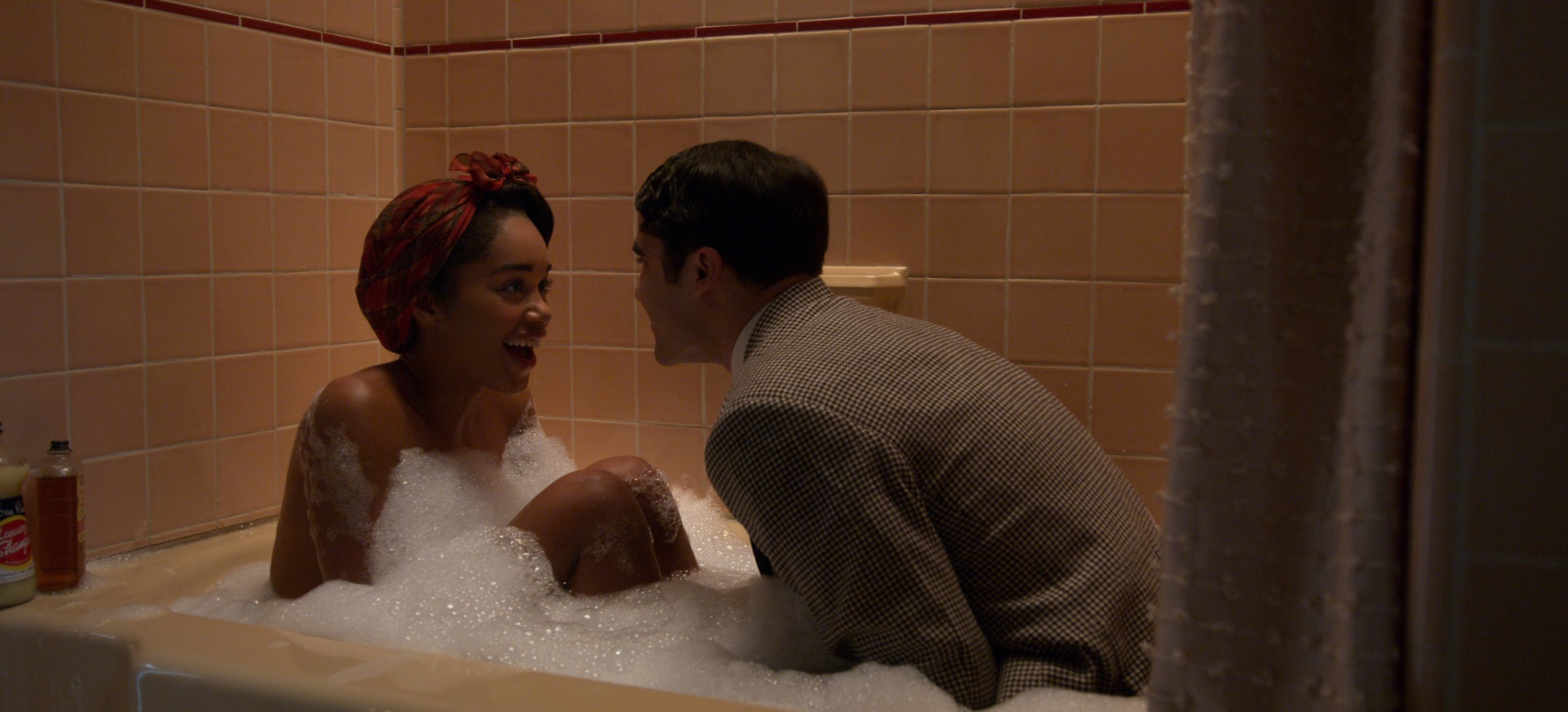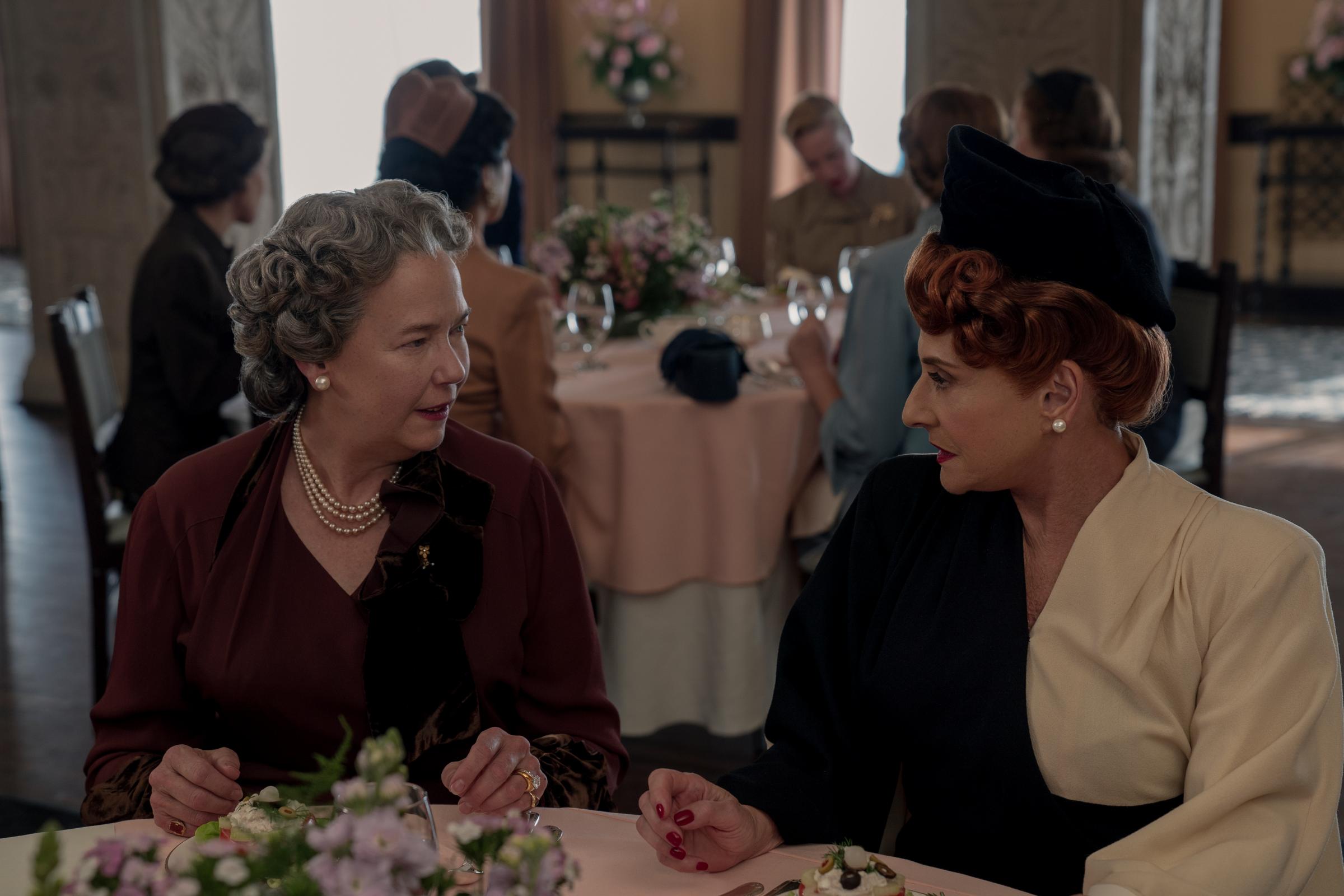
Hollywood never stops feeling nostalgic for its golden age. In Barton Fink and Hail, Caesar! the Coen Brothers conjured a world of slumming playwrights banging out scripts, blowhard studio execs chomping cigars and feisty gossip columnists digging for dirt on ridiculously fertile ground. Surprise 2012 Best Picture winner The Artist was a bittersweet remembrance of silent cinema. Every generation gets its own remake of A Star Is Born. And last year’s Quentin Tarantino hit Once Upon a Time… in Hollywood, set in 1969, rewrites history to imagine the old studio system and its cowboys winning out over a new generation of hippies and radicals.
Now Ryan Murphy, who amended one chapter of studio history with 2017’s Feud: Bette and Joan, reimagines the entire industry in the boldly titled miniseries Hollywood. Arriving on Netflix May 1, his take is as fantastical as Tarantino’s—but as you’d expect from the megaproducer whose outstanding American Crime Story anthology made Marcia Clark a feminist hero and transformed the murder of Gianni Versace into an allegory about homophobia, it’s also far more progressive. Pushed to the margins of Once Upon a Time, black, Asian-American, female and queer characters are the stars of this story from Murphy and Ian Brennan. If only the show, for all its glittery, fast-paced fun, wasn’t so glib and self-important.
Hollywood opens just after World War II, as handsome, naive, broke, not-especially-talented newlywed veteran Jack Costello (charming blank slate David Corenswet, last seen in Murphy’s The Politician) lands in L.A. with dreams of fame. Blessed with neither training nor connections, he’s just a face in the crowd of wannabes who swarm studio gates every morning, begging to be cast as an extra—until aging Errol Flynn look-alike Ernie (Dylan McDermott, excellent) discovers him in a bar. Sadly, Ernie isn’t a movie producer; he’s the owner of a gas station that turns out to be a front for an all-male prostitution ring.
Murphy, who co-wrote six out of seven episodes, takes his time setting the postwar scene with lush recreations of fancy hotels and gleaming studio lots. But eventually our straight, white, male presumptive hero gets absorbed into a larger narrative that has black, gay aspiring screenwriter Archie (Jeremy Pope) and biracial upstart director Raymond (Murphy regular Darren Criss) attempting to make a movie at the fictional Ace Studios. Vying for roles in this film-within-a-show about Peg Entwistle, the struggling actor who jumped off the Hollywood sign to her death in 1932, are contract players Jack; ambitious Claire (Samara Weaving); Raymond’s talented girlfriend Camille (Laura Harrier), who is black; and Archie’s paramour Rock Hudson (Jake Picking). The challenge is to get the older generation that controls the purse strings, played by scene stealers Patti LuPone, Rob Reiner, Holland Taylor and Jim Parsons—in a fabulously deranged performance as real-life predatory agent Henry Willson—on board with their radical vision.

Hollywood wants viewers to imagine an entertainment industry whose politics were decades ahead of reality—one that not only welcomed marginalized artists, but also told their stories. What if Hudson hadn’t been closeted? What if Anna May Wong (played here by Michelle Krusiec) didn’t have to portray Asian stereotypes? What if Hattie McDaniel (Queen Latifah) could’ve seen her sacrifices pay off? What if the Hollywood that chewed up, spit out, molested or simply ignored the outsiders in its midst had been overthrown by a gentler new regime?
It’s a lovely sentiment, and the show does sometimes achieve the righteous thrills it sets out to provide. But beyond the plot holes and absurd twists and preachy speeches that Murphy fans routinely forgive out of affection for his exuberant, propulsive, pluralistic fictions, it lionizes some questionable figures—like Ernie, who has made his living essentially duping desperate young men into sex work. And it makes enacting large-scale social change look too easy. “I used to believe that good government could change the world,” Eleanor Roosevelt (Harriet Sansom Harris) laments in a surprise visit to Ace. “I don’t know that I believe that anymore. However, what you do… can change the world.”
Intentional or not, the implication behind this bit of showbiz self-flattery is that one movie might have accomplished the work of every ’60s liberation movement, built on years of hard work by millions of activists. Particularly after 2016—when American politics veered dramatically to the right even as TV, movies and music became ever more inclusive—Hollywood’s act of faith feels naive.
More Must-Reads from TIME
- Cybersecurity Experts Are Sounding the Alarm on DOGE
- Meet the 2025 Women of the Year
- The Harsh Truth About Disability Inclusion
- Why Do More Young Adults Have Cancer?
- Colman Domingo Leads With Radical Love
- How to Get Better at Doing Things Alone
- Michelle Zauner Stares Down the Darkness
Contact us at letters@time.com